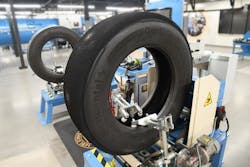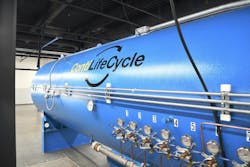The National Highway Traffic Safety Administration determined in an oft-cited 2008 study that, contrary to popular belief, well-maintained retreads are not more likely to fail than equally cared-for new tires. Yet many bulk haulers continue to avoid retreads for fear of “road gators” damaging delicate trailer equipment.
Tank truck carriers shouldn’t worry either, insists Continental’s John Cox.
“The failure rate, since I’ve been in the industry, has always been less on retread manufacturing than new tire manufacturing,” said Cox, head of retread truck tires Americas, and a 30-year veteran of the retread industry.
“The adjustment rate is much lower.”
The lower adjustment rate, or percentage of faulty tires relative to the total number of tires produced, suggests retreads are as safe as new tires, too. The Retread Tire Association maintains on its website recapped tires “offer exactly the same amount of safety” for drivers and others as any brand of new tires, and Cox points out Continental makes “high-quality” retreads for all commercial vehicles, including massive on/off road construction equipment—and tank trucks maxed out at 80,000 lbs.
“Anything a new tire can withstand, a retread is going to withstand,” he said. “You’re just putting the tread back onto the casing, so you’re not affecting casing integrity at all.”
Continental’s rigid “3G Casing” enhances retread reliability, adds Shaun Uys, Continental vice president for truck tires in the U.S. But tank fleet managers who remain unconvinced are welcome to visit the tire manufacturer’s new Retread Solutions Development Center in Rock Hill, South Carolina, where engineers aim to advance retread processes and technology with a “progressive” R&D approach.
“There hasn’t been a whole lot of innovation in retreading since I was a young lad,” Cox told gathered media during the facility’s official opening on March 21, which also included a celebration of Continental Tire’s new sustainably designed, 90,000-sq.-ft. Americas headquarters in nearby Fort Mills.
“[Here] we have a great opportunity to do exactly that.”
‘Open for business’
The development center is a key piece in Continental’s plan to grow its presence in the U.S. commercial retread segment, which it only entered in 2011, and steal market share from leading players Bridgestone, Goodyear, and Michelin. “We are ready for growth,” said Renato Sarzano, head of Continental’s truck tires business in the Americas. “We have plant capacity to produce more treads than we produce today, [and] we have a lot of prospects—customers willing to convert and start with us.
“So it’s the right time to announce we are open for business.”
See also: Continental spotlights advanced tire technology in Uvalde
Continental now boasts about 30 BestDrive commercial tire centers in the U.S., according to Carolina Wagner, head of marketing and digital solutions, but the company will lean on its partner network to expand its U.S. retread solutions operation, prompting the “open-for-business” declaration from Sarzano and Uys. And the development center will aid in that effort, equipping Continental to deliver “innovation and up-to-date retread processes” inside an environment well suited for employee training and relationship-enhancing tours by fleet customers and new ContiLifeCycle (CLC) partners.
“We’re rethinking everything within retread,” Cox said.
The development center features 10 CLC stations filled with state-of-the-art machinery and automation that help Continental demonstrate and refine the retread process. The stations cover initial inspection, shearography, buffing, skiving, repair, extruding, tread building, enveloping, curing, and final inspection. The “shearography” machine inspects the inside of the tire for imperfections invisible to the naked eye. Flaws the machine identifies are marked and addressed later in the process.
Continental also is testing a machine that uses RFID technology to track a carcass during the retread process, and virtual reality googles for closer examinations of tires, carcasses, and retreads alongside CLC partners.
“This center gives us a unique opportunity to continue to make advancements in the retreading part of our business,” Uys said in a news release. “Not only will we be able to continue to improve our process, but we can also now provide our Continental retread solutions partners with hands-on training from miles away.”
ContiLifeCycle sustainability
The ContiLifeCycle concept provides a “cradle-to-grave” approach to tire management that prolongs the life of truck tires at every stage, Continental said. The process begins with new tires built on 3G Casings, which are designed to be retreaded, and is enhanced by Continental’s digital tire monitoring system, ContiConnect, ensuring the tire is properly inflated and the casing stays in “prime” retread condition.
This approach “significantly” lowers total cost of ownership and helps actively protect the environment, Continental added. The Tire Retread and Repair Information Bureau (TRIB) reports up to 44% of all commercial tires on the road in the U.S. and Canada are retreaded tires, annually saving approximately 217.5 million gallons of oil and preventing up to 1.4 billion pounds of rubber from ending up landfills. Retreads also save 24% on CO2 emissions and up to 29% of land use compared to new tires, TRIB says.
“[Retreading] was one of the original sustainability projects,” Cox summarized, noting the process debuted in 1912.
New Americas headquarters
Continental’s commitment to sustainability carries over to its new Americas headquarters positioned on 33 acres in Lancaster County. The building qualifies for Leadership in Energy and Environmental Design (LEED) Gold Certification, and features 10 electric vehicle charging stations, 840 solar panels on the roof and in the parking area that supply up to 25% of the building’s total energy, rainwater harvesting for irrigation, LED lighting, recycled-content carpet tiles, and low-VOC paint.
“Another great moment for Continental and for the state of South Carolina,” Jochen Etzel, Continental Tire the Americas CEO, said in a news release. “Who would have imagined when we moved to the Palmetto state in 2009, that we would have invested over $800 million in our facilities across the state. The U.S. is a strategic growth market for Continental and particularly for our Tire business.”
The celebratory opening included appearances by South Carolina Gov. Henry McMaster, who presented Etzel with a state flag, and Brian Carnes, Lancaster County Council vice chairman, who proclaimed March 21, 2024, Continental Tires the Americas Day in recognition of its ongoing investment in South Carolina.
“I want to offer my sincere congratulations on building such a fine facility that speaks volumes about the values of Continental as a company and community partner,” Carnes said.
About the Author
Jason McDaniel
Jason McDaniel, based in the Houston TX area, has more than 20 years of experience as an award-winning journalist. He spent 15 writing and editing for daily newspapers, including the Houston Chronicle, and began covering the commercial vehicle industry in 2018. He was named editor of Bulk Transporter and Refrigerated Transporter magazines in July 2020.





